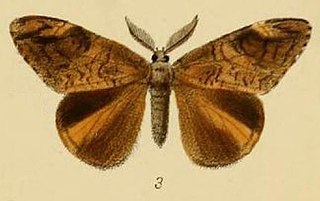
Utetheisa is a genus of tiger moths in the family Erebidae. The genus was first described by Jacob Hübner in 1819.

Argina is a genus of tiger moths in the family Erebidae. They are distributed throughout Africa, Mauritius, China, India, Sri Lanka, Myanmar, Andaman Islands, New Guinea and Australia.

Miltochrista is a genus of moths of the family Erebidae, subfamily Arctiinae. The genus was erected by Jacob Hübner in 1819.
Nishada is a genus of moths in the family Erebidae. They are found in India, Sri Lanka, Myanmar, Sumatra, and Borneo.

Lymantria is a genus of tussock moths in the family Erebidae. They are widely distributed throughout Europe, Japan, India, Sri Lanka, Myanmar, Java, and Celebes. The genus was erected by Jacob Hübner in 1819.

Ancylolomia is a genus of moths of the family Crambidae described by Jacob Hübner in 1825.

Acontia is a genus of moths of the family Noctuidae. The genus was named by Ferdinand Ochsenheimer in 1816. Eusceptis, Pseudalypia and Spragueia are sometimes included in the present genus, but here they are tentatively treated as different pending further research. Many species of Tarache were also once placed here.

Adrapsa is a genus of moths of the family Erebidae. It was erected by Francis Walker in 1859.

Avitta is a genus of moths of the family Noctuidae described by Francis Walker in 1858.

Catada is a genus of moths of the family Erebidae. It was first described by Francis Walker in 1859.

Leucania is a genus of moths of the family Noctuidae first described by Ferdinand Ochsenheimer in 1816.

Plusiodonta is a genus of moths in the family Erebidae erected by Achille Guenée in 1852.

Spirama is a genus of moths in the family Erebidae first described by Achille Guenée in 1852.

Aroa is a genus of moths in the subfamily Lymantriinae first described by Francis Walker in 1855. Species are distributed in South Africa, China, throughout India, Sri Lanka, Myanmar, and Java.

Euproctis is a genus of tussock moths in the family Erebidae described by Jacob Hübner in 1819. Species are cosmopolitan, widespread throughout Palearctic, African, Oriental and Australian regions. Molecular phylogenetic studies indicate that the genus as presently understood comprises a large number of unrelated lineages, only a few of which have names, and is therefore in serious need of revision.

Laelia is a genus of tussock moths in the family Erebidae. The genus was described by Stephens in 1828. Species are well distributed throughout Europe, Japan, China, India, Sri Lanka, Myanmar and Java.

Leucoma is a genus of tussock moths in the family Erebidae. The species are well distributed in Palearctic, Ethiopian, and Oriental regions along with New Britain and Ireland. It was described by Jacob Hübner in 1822.

Asota is a genus of moths in the family Erebidae first described by Jacob Hübner in 1819. Species are widely distributed throughout Africa, India, Sri Lanka, Myanmar, the Malayan region and tropical parts of the Australian region.

Agathia is a genus of moths in the family Geometridae described by Achille Guenée in 1858.

Striglina is a genus of moths of the family Thyrididae described by Achille Guenée in 1877.



















